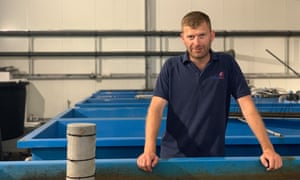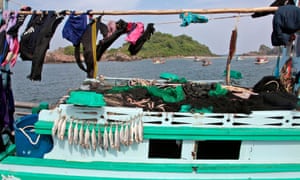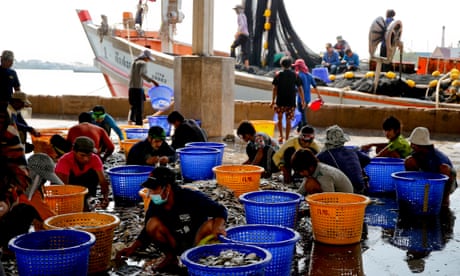UK: Farmer produces ethical king prawns in a Lincolnshire field
By Saeed Kamali Dehghan From The Guardian UK

Most warm water prawns sold in UK are imported from Asia and are tainted with allegations of slavery and environmental destruction
At a farm in Lincolnshire two aquaculturists are busy feeding thousands of larvae in a dozen large tanks designed to emulate a seawater environment.
This is the UK’s first warm water king prawn producer. In less than three and a half months, each wriggling little creature will grow to weigh 30g, ready to be harvested and sold to retailers and restaurants. FloGro Fresh is the first company in Britain to bring Pacific whiteleg prawns fresh to the market – most prawns consumed in the UK are imported frozen from India, Vietnam, Thailand, Ecuador or Honduras.
In an industry rife with human trafficking and modern slavery, and notorious for its destruction of marine ecosystems, FloGro is one farmer’s attempt to produce farmed prawns that are sustainable and ethical.Advertisement
“The beauty of our operation is that it’s entirely fresh, everything that comes from overseas has been frozen,” said Ralph Maxwell, FloGro’s managing director.
The team at FloGro “get the order in the morning, go and harvest it immediately from the tank and they’re shipped to the customer overnight and will be in the restaurant the following day. So in less than 24 hours you have that order.”
“They know exactly where it comes from,” he added. “There is provenance and there is traceability to everything we do, so if the customer or chef wants to come and see it they can come up and see the prawn. We don’t know where the prawns come from in southeast Asia, but I’m told they come from very dubious places.”
More than 81,000 tonnes of shrimp and prawn (worth £691.8m) are imported to the UK annually, according to 2017 figures released recently by Seafish. Only 0.1% of the total volume of species arriving to the UK from British vessels were shrimps and prawns, according to the report, but warm water prawns were the sixth best selling seafood species in the country.


The Marine Conservation Society has given a thumbs up to FloGro’s methods of production and sustainability. Its closed-loop aquaculture system uses renewable energy – a combination of rooftop solar panels and wind power from Lincolnshire.
750 cubic metres of water, heated via a biomass boiler fed with wood pellets to ensure it remains at 28C (82F) at all times, is filtered and recycled robustly. Prawn poo is spread on land as fertiliser.
A major issue with intensive prawn farming in places like Asia is the use of polluting chemicals and antibiotics. According to the Environmental Justice Foundation, “the production of prawns can be responsible for serious environmental degradation, such as the destruction of mangroves, wetlands and coral reefs, destruction of marine and coastal biodiversity and mass drowning of sea turtles and other protected species. It has also been linked to human rights abuses, such as child, forced and bonded labour, intimidation, violence and even murder.”
Neil Campbell, head chef at Yotam Ottolenghi’s Fitzrovia restaurant Rovi, said the restaurant’s relationship with the farm was key in choosing their product.
“I can pick the phone up and speak with Ralph, talk about prawn sizes, weight, feeding habits, quality and so on,” he said. “Prawns arrive fresh and in superb quality. [It is reassuring] that the prawns and staff there are getting a good life.”
Campbell said FloGro’s sustainable farming methods were equally important. “The system which Ralph and his team use is state of the art. With the ever growing world population and rising food consumption, our sea life is under threat. We need farms that can produce it [in the right way].”
FloGro receives a shipment of 150,000 larvae from the US every four to five weeks. Boxes containing baby shrimps in highly oxygenated pure seawater arrive at Heathrow. The larvae go through an acclimatisation period before being placed in blue tanks filled with salted water, known as nursery tanks. They stay there for 28 days, growing from 0.003g to 0.03g. Another 28 days are spent in six intermediary tanks where they grow to 2–3g each. They spend the rest of their lives in 12 concrete “grow-out” tanks.
In contrast with conventionally farmed prawns in Asia and Latin America, which are often fed with fishmeal obtained through illegal fishing, FloGro prawns are fed with fishmeal from France that is sourced from off-cuts from human consumption.


“We’re not killing fish to put in our prawns, it’s only the waste product from human consumption,” said production manager Richard Clarke. Born in Lincolnshire, Clarke studied aquaculture and fisheries management and is now one of two full-time staff on the farm. Two part-timers help at the weekend.


The prawns are harvested twice a week. They stop feeding 24 hours before so the back vein is empty when they are harvested, making life easier for chefs. The prawns die instantly when put into iced water. They are then vacuum-packed and kept chilled until they are ready to be delivered. They cost £20 per kilo.
Maxwell said the response to the British prawns has been overwhelming. “Our problem is that we can’t supply enough,” he said. The company is now focusing on setting up its own hatchery to increase production.
FloGro, set up in 2015, is also looking at ways to sell an important byproduct of the prawn shells: chitosan, which can be used in cosmetics and pharmaceuticals. Every two to three weeks, prawns shed their shells.
“A lot of restaurants have stopped selling imported prawns because they don’t know where they come from,” said Maxwell. “The consumer drives the marketplace and is becoming far more sophisticated. They want to know where the prawn has come from, so that’s a big plus for us. That is why there is a potential to grow our industry in the UK.”
As the crisis escalates…
… in our natural world, we refuse to turn away from the climate catastrophe and species extinction. For The Guardian, reporting on the environment is a priority. We give reporting on climate, nature and pollution the prominence it deserves, stories which often go unreported by others in the media. At this pivotal time for our species and our planet, we are determined to inform readers about threats, consequences and solutions based on scientific facts, not political prejudice or business interests.
More people are reading and supporting The Guardian’s independent, investigative journalism than ever before. And unlike many news organisations, we have chosen an approach that allows us to keep our journalism accessible to all, regardless of where they live or what they can afford. But we need your ongoing support to keep working as we do.
The Guardian will engage with the most critical issues of our time – from the escalating climate catastrophe to widespread inequality to the influence of big tech on our lives. At a time when factual information is a necessity, we believe that each of us, around the world, deserves access to accurate reporting with integrity at its heart.
Our editorial independence means we set our own agenda and voice our own opinions. Guardian journalism is free from commercial and political bias and not influenced by billionaire owners or shareholders. This means we can give a voice to those less heard, explore where others turn away, and rigorously challenge those in power.
We need your support to keep delivering quality journalism, to maintain our openness and to protect our precious independence. Every reader contribution, big or small, is so valuable. Support The Guardian from as little as $1 – and it only takes a minute. Thank you.
For more on this story and to donate go to: https://www.theguardian.com/environment/2019/aug/07/farmer-produces-ethical-king-prawns-in-a-lincolnshire-field





